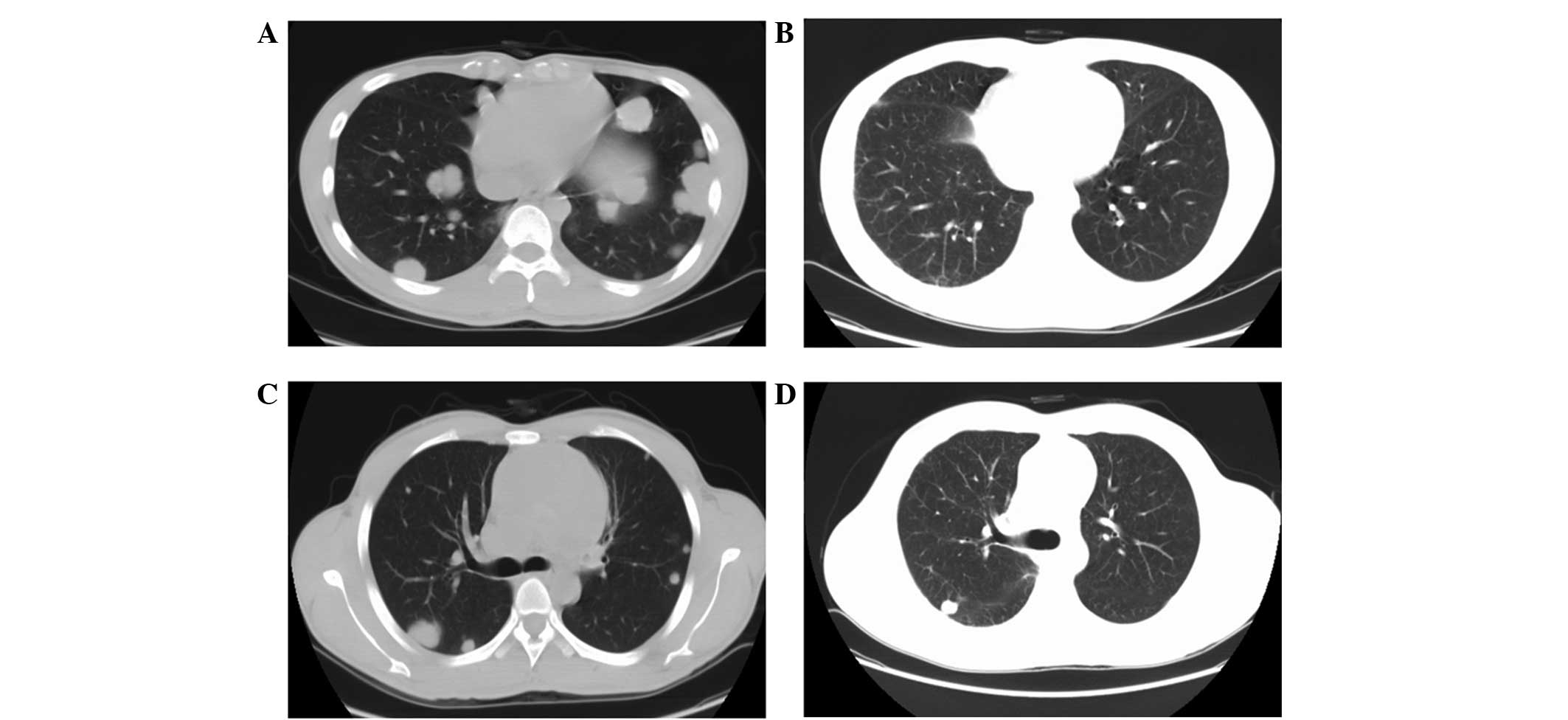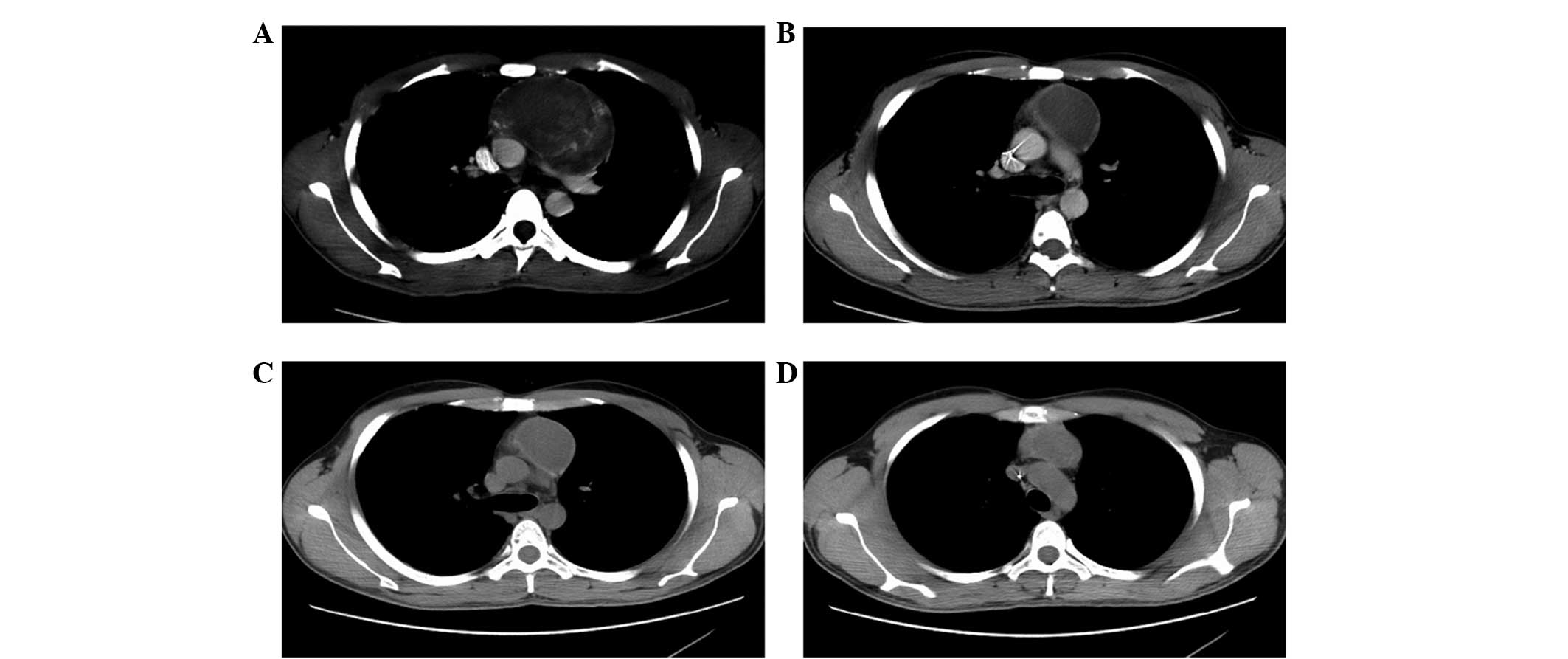|
1
|
Collins DH and Pugh RC: Classification and
frequency of testicular tumours. Br J Urol. 36:1–11.
1964.PubMed/NCBI
|
|
2
|
Moran CA and Suster S: Primary mediastinal
choriocarcinomas: A clinicopathologic and immunohistochemical study
of eight cases. Am J Surg Pathol. 21:1007–1012. 1997. View Article : Google Scholar : PubMed/NCBI
|
|
3
|
Gaude GS, Patil P, Malur PR, Kangale R,
Dhorigol V, Anurshetru S and Karanji J: Primary mediastinal
choriocarcinoma. South Asian J Cancer. 2:792013. View Article : Google Scholar : PubMed/NCBI
|
|
4
|
Lynch MJG and Blewitt GL: Choriocarcinoma
arising in the male mediastinum. Thorax. 8:157–161. 1953.
View Article : Google Scholar : PubMed/NCBI
|
|
5
|
Ramia JM, Alcalde J, Dhimes P and Cubedo
R: Metastasis from choriocarcinoma of the mediastinum producing
acute appendicitis. Dig Dis Sci. 3:332–334. 1998. View Article : Google Scholar
|
|
6
|
Jiang F, Xiang Y, Feng FZ, Ren T, Cui ZM
and Wan XR: Clinical analysis of 13 males with primary
choriocarcinoma and review of the literature. OncoTargets Ther.
7:1135–1141. 2014. View Article : Google Scholar
|
|
7
|
Yokoi K, Tanaka N, Furukawa K, Ishikawa N,
Seya T, Horiba K, Kanazawa Y, Yamada T, Ohaki Y and Tajiri T: Male
choriocarcinoma with metastasis to the jejunum: A case report and
review of the literature. J Nippon Med Sch. 75:116–121. 2008.
View Article : Google Scholar : PubMed/NCBI
|
|
8
|
Krema H, Navajas E, Simpson ER and Payne
D: Choroidal metastasis from a mediastinal choriocarcinoma in a
male. Can J Ophthalmol. 46:551–552. 2011. View Article : Google Scholar : PubMed/NCBI
|
|
9
|
Shen HH, Zhang GS and Xu F: Primary
choriocarcinoma in the anterior mediastinum in a man: A case report
and review of the literatures. Chin Med J (Engl). 117:1743–1745.
2004.PubMed/NCBI
|
|
10
|
Fine G, Smith RW Jr and Pachter MR:
Primary extragenital choriocarcinoma in the male subject. Case
report and review of the literature. Am J Med. 32:776–794. 1962.
View Article : Google Scholar : PubMed/NCBI
|
|
11
|
Deshpande JR and Kinare SG:
Choriocarcinomatous transformation in metastases of an anaplastic
lung carcinoma-a case report. Indian J Cancer. 24:161–166.
1987.PubMed/NCBI
|
|
12
|
Szturmowicz M, Slodkowska J, Zych J,
Rudzinski P, Sakowicz A and Rowinska-Zakrzewska E: Frequency and
clinical significance of beta-subunit human chorionic gonadotropin
expression in non-small cell lung cancer patients. Tumour Biol.
20:99–104. 1999. View Article : Google Scholar : PubMed/NCBI
|
|
13
|
Tscherry G, Jacky E, Jost LM and Stahel
RA: Risk-adapted chemotherapy of germ cell tumors with carboplatin,
etoposide and bleomycin for low-risk and cisplatin, etoposide and
ifosfamide for high-risk patients. A single-center study. Oncology.
59:110–117. 2000. View Article : Google Scholar : PubMed/NCBI
|
|
14
|
Oshima J, Uemura M, Kato T, Nagahara A,
Kiuchi H, Tsujimura A and Nonomura N: Modified BEP regimen leads to
abatement of choriocarcinoma syndrome in a patient with extra
gonadal germ cell tumor: A case report. Hinyokika Kiyo. 60:183–187.
2014.(In Japanese). PubMed/NCBI
|
|
15
|
US Department of Health and Human
Services. Common Terminology Criteria for Adverse Events (CTCAE).
Version 3. National Institute of Health. National Cancer Institute.
(Washington, DC). 2006.
|
|
16
|
Eisenhauer EA, Therasse P, Bogaerts J,
Schwartz LH, Sargent D, Ford R, Dancey J, Arbuck S, Gwyther S,
Mooney M, et al: New response evaluation criteria in solid tumours:
Revised RECIST guideline (version 1.1). Eur J Cancer. 45:228–247.
2009. View Article : Google Scholar : PubMed/NCBI
|
|
17
|
Belliveau RE, Wiernik PH and Sickles EA:
Blood carcinoembryonic antigen, Regan isoenzyme, and human
chorionic gonadotrophin in a man with primary mediastinal
choriocarcinoma. Lancet. 1:22–24. 1973. View Article : Google Scholar : PubMed/NCBI
|
|
18
|
Kathuria S and Jablokow VR: Primary
choriocarcinoma of mediastinum with immunohistochemical study and
review of the literature. J Surg Oncol. 34:39–42. 1987. View Article : Google Scholar : PubMed/NCBI
|
|
19
|
Bokemeyer C, Nichols CR, Droz JP, Schmoll
HJ, Horwich A, Gerl A, Fossa SD, Beyer J, Pont J, Kanz L, et al:
Extragonadal germ cell tumors of the mediastinum and
retroperitoneum: Results from an international analysis. J Clin
Oncol. 20:1864–1873. 2002. View Article : Google Scholar : PubMed/NCBI
|
|
20
|
Ruan Z, Wang S, Wang Z and Jing Y: A rare
case of bilateral massive hemothorax from spontaneous rupture of a
primary mediastinal mixed germ cell tumor. Ann Thorac Surg.
93:664–666. 2012. View Article : Google Scholar : PubMed/NCBI
|
|
21
|
Yoon JH, Kim MS, Kook EH, Ahn SH, Jeong
SY, Han MS, Huh JK, Kang HJ, Na II, Cho SY, et al: Primary gastric
choriocarcinoma: Two case reports and review of the literatures.
Cancer Res Treat. 40:145–150. 2008. View Article : Google Scholar : PubMed/NCBI
|
|
22
|
Cohen BA and Needle MA: Primary
mediastinal choriocarcinoma in a man. Chest. 67:106–108. 1975.
View Article : Google Scholar : PubMed/NCBI
|
|
23
|
Shastri A, Daver NG and Hayes TG: Primary
gastric chorioadenocarcinoma: A needle in a haystack. Rare Tumors.
3:e192011. View Article : Google Scholar : PubMed/NCBI
|
|
24
|
Zhang F, Zhang W, Shi H, Ye G, Shi W, Shu
Y and Li G: Primary choriocarcinoma of the posterior mediastinum in
a male: A case report and review of the literature. Oncol Lett.
8:739–741. 2014.PubMed/NCBI
|
|
25
|
Liu Z, Mira JL and Cruz-Caudillo JC:
Primary gastric choriocarcinoma: A case report and review of the
literature. Arch Pathol Lab Med. 125:1601–1604. 2001.PubMed/NCBI
|
|
26
|
Yamane T, Egawa H, Deguchi N and Moritani
C: A case of primary mediastinal choriocarcinoma. Nihon Kokyuki
Gakkai Zasshi. 44:48–54. 2006.(In Japanese). PubMed/NCBI
|
















